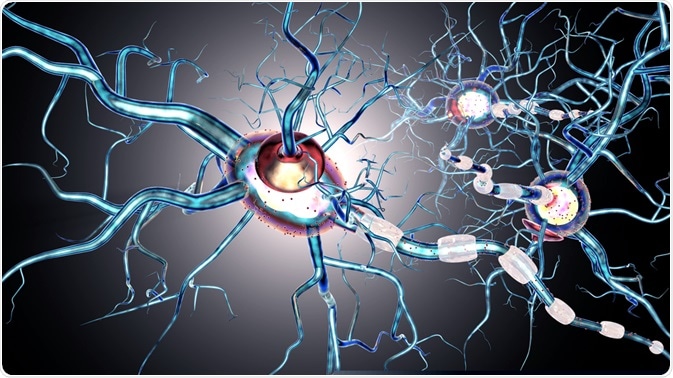Effect of Environmental Toxicants on Developing Neurodegenerative Conditions
An article published in the Journal of the American College of Nutrition has discussed the impact of environmental toxicants amongst the role of a healthy diet, lifestyle improvement, and nutraceuticals targeting in the treatment of neurodegenerative diseases such as Alzheimer’s and Parkinson’s progression.

Image Credit: Ralwell/Shutterstock.com
Neurodegenerative diseases are associated with mitochondrial dysfunction as a result of impaired energy production, reduced ability to buffer calcium, and aberrant activation of proteases and phospholipases which culminates in oxidative stress and inflammation.
The mitochondrial dysfunction, calcium overload, oxidative stress, and inflammation represent the four major pathways of neuronal damage. Although not curable, there are treatments available to manage the symptoms and slow disease progression.
Oxidative stress in neurodegenerative diseases
Oxidative stress in neurodegenerative conditions induces microglial cell activation, the aggregation of proteins inflammation in the brain, and further mitochondrial dysfunction leading to neuronal death.
Neurodegenerative diseases are characterized by the gradual and selective loss of neurons in the CNS and PNS. The most common include Alzheimer's disease and Parkinson’s disease which can give rise to dementia.
The amyloid cascade hypothesis: the cause of neurodegenerative disease
Alzheimer's has two recognizable hallmarks; (1) familial or early-onset, directly related to specific gene mutations in the amyloid precursor protein and presenilin, and (2) the Tau protein hyperphosphorylation, followed by deposition as neurofibrillary tangles (NFT).
According to an earlier amyloid cascade hypothesis by Chin-Chan, Navarro-Yepes, & Quintanilla-Vega, amyloid-beta (Aβ) peptide aggregation triggers brain damage leading to memory loss until Alzheimer's. While that is no cure, treatments are based on alleviating symptoms. As such, early diagnosis is essential to slow the progression of the disease.
The mechanistic basis of the environmental factors causing Alzheimer’s
Diagnosis of Alzheimer's is based on the determination of Tau and Aβ levels, combined with several other data including medical history and brain structure or function obtained by neuroimaging techniques.
Environmental alteration of the molecular mechanisms associated with Parkinson’s
In addition to aging, which is the main risk factor for Parkinson’s, epidemiological evidence suggests that exposure to environmental toxicants, mainly pesticides, metals, and solvents could increase the risk of developing Parkinson’s Disease.
This leads to selective loss of dopaminergic neurons in the substantia nigra pars compacta (SNpc). This is caused by the alteration of several molecular mechanisms including mitochondrial dysfunction, diminished protein quality pathways, the activation of microglia, and inflammation. These culminate in the production of oxidative stress.
The toxicant influence on neurodegeneration
There is a correlation between past occupational exposure to toxicants and an increased risk of developing Alzheimer's or Parkinson's disease. There are limited epidemiological studies to determine the association between environmental toxicant exposures and Alzheimer's, however in vitro and animal studies have identified toxic effects of environmental contaminants that have demonstrated alterations in pathways associated with the pathogenesis of the disease.
Several molecular targets can be modified to varying degrees. The disruption to these pathways follows the amyloid hypothesis that results in Aβ senile plaques formation and Tau hyperphosphorylation which deposit as neurofibrillary tangles (NFTs).
Emerging nutraceuticals
Combined overproduction of ROS and the suppression of antioxidant systems can cause oxidative stress which underlies the pathogenesis of neurodegeneration. Nutrigenomics examines how nutrition alters the genetics and epigenetics of age-related neurodegenerative diseases.
It is believed that modifying antioxidant systems represents a therapeutic strategy for the treatment of Parkinson’s and Alzheimer’s, among other neurodegenerative diseases. The employ of Nutraceuticals, which work to scavenge ROS and induce the expression of a variety of cytoprotective and detoxification proteins, presents a therapeutic target for neurodegenerative diseases.
Among detoxification, they can suppress inflammation, minimize the aggregation of proteins and modulate signaling pathways.
The authors note the importance of food processing on the antioxidative and mitochondrial dynamic-modifying properties of food.
Finally, while links between nutrigenomics and the pathogenesis of neurodegenerative diseases have been made, further studies are required to cement an understanding of how these bioactive compounds, derived from the diet, prevent neurodegenerative diseases caused by toxicant exposure.
The combined effects of lifestyle improvements, adoption of a healthy diet, and studies of mitochondrial interaction with disease-related protein alongside nutraceutical targeting and further insight into toxicant exposure provide a means to treat neurodegenerative diseases such as Alzheimer's and Parkinson's.
Source
- Agnihotri, A & Aruoma, OI (2020) Alzheimer’s Disease and Parkinson’s Disease: A Nutritional Toxicology Perspective of the Impact of Oxidative Stress, Mitochondrial Dysfunction, Nutrigenomics, and Environmental Chemicals. Journal of the American College of Nutrition. doi: 10.1080/07315724.2019.1683379
- Chin-Chan M, Navarro-Yepes J & Quintanilla-Vega B (2015) Environmental pollutants as risk factors for neurodegenerative disorders: Alzheimer and Parkinson diseases. Front Cell Neurosci. doi:10.3389/fncel.2015.00124
Last Updated: Sep 30, 2020

Written by
Hidaya Aliouche
Hidaya is a science communications enthusiast who has recently graduated and is embarking on a career in the science and medical copywriting. She has a B.Sc. in Biochemistry from The University of Manchester. She is passionate about writing and is particularly interested in microbiology, immunology, and biochemistry.
Source: Read Full Article
